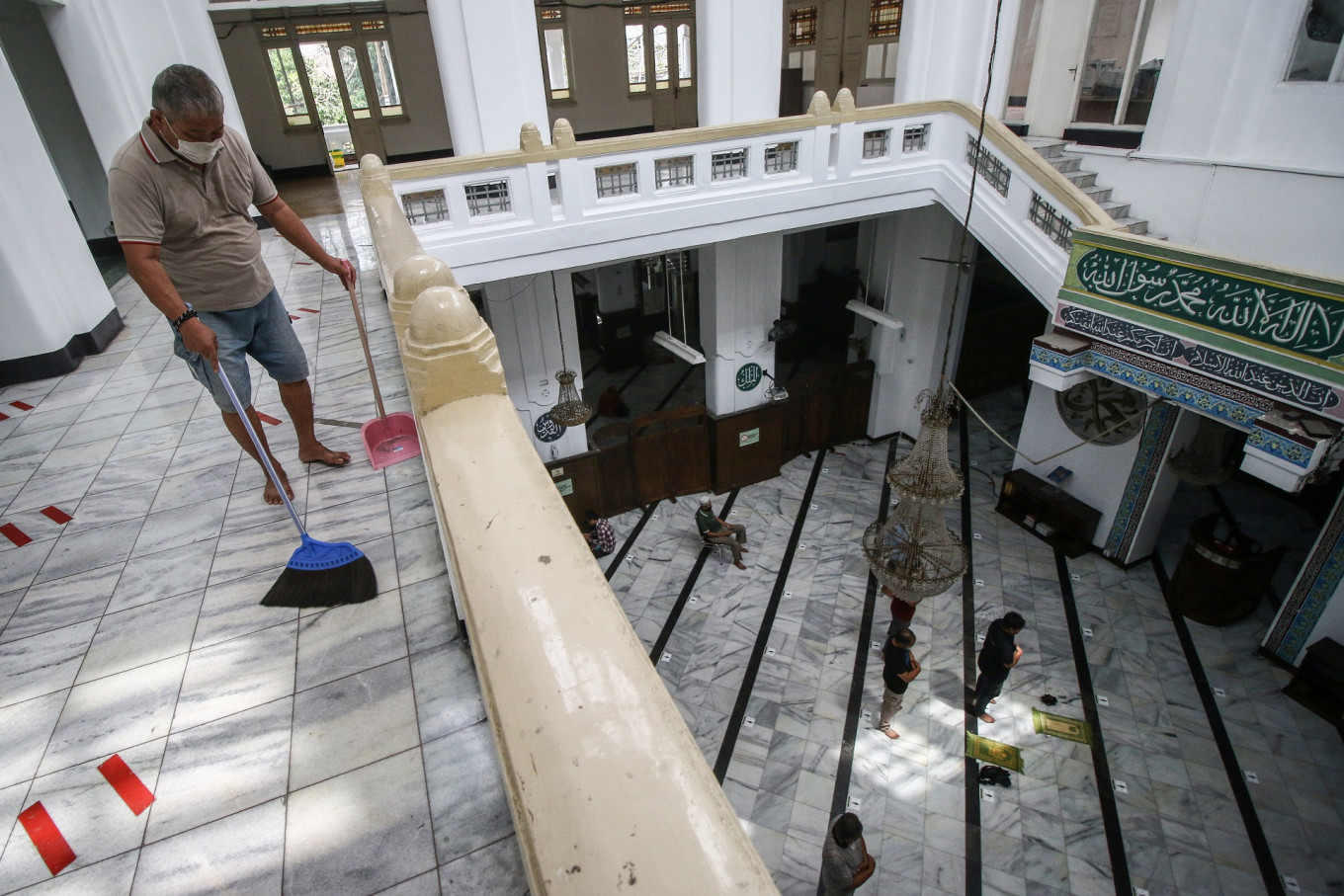Popular Reads
Top Results
Can't find what you're looking for?
View all search resultsPopular Reads
Top Results
Can't find what you're looking for?
View all search resultsMuslims enjoy relaxed rules in second Ramadan during pandemic
The Religious Affairs Ministry allows places of worship to operate at 50 percent of their capacity during Ramadan, giving Muslims an opportunity to perform congregational tarawih (Ramadan evening prayers) at mosques.
Change text size
Gift Premium Articles
to Anyone
M
uslims in Jakarta celebrate the second Ramadan during the COVID-19 pandemic under better circumstances than last year, as restrictions are eased following a drop in confirmed cases and the gradual rollout of vaccines.
Intan Almira, a 26-year-old pharmacist in West Jakarta, said it was a special eve of Ramadan on Monday as she was able to attend a sermon at a mosque in South Jakarta.
Prior to the pandemic, she used to attend sermons at the mosque twice a week, but when the COVID-19 outbreak hit the capital in March last year, the sermons and other congregational religious activities moved online to curb the transmission of the disease.
While listening to sermons from her home was comfortable, Intan said she missed the sense of community felt during religious services at mosques.
"Things are a little bit different now. Fewer people are attending the sermons compared to before the pandemic and we need to sit a few meters apart from each other and wear masks. But I’m glad things are starting to come back to normal,” Intan said recently.
Similarly, 31-year-old Sucipto said he could not wait to take part in the congregational tarawih (Ramadan evening prayers).
"Last year, I performed the tarawih at home. It didn’t feel the same,” the construction manager living in East Jakarta said.
Last year, the Religious Affairs Ministry urged people not to hold gatherings, including congregational prayers that are usually done at mosques. But this year, the ministry allows mosques to remain open during Ramadan, operating at a maximum 50 percent of capacity and under strict health protocol. Worshippers are required to wear masks, bring their own prayer rugs and maintain a physical distance of at least 1 meter from each other.
While the ministry allows people to hold breaking-of-the-fast gatherings at public places at 50 percent of capacity, Jakarta Governor Anies Baswedan urged Jakartans to avoid gatherings to prevent a surge in COVID-19 cases in the capital.
Being the country’s COVID-19 hotbed in the past year, Jakarta claimed a steady decrease in the number of daily cases and deaths in the past ten weeks -- the longest decline since the pandemic started.
The number of daily confirmed cases has dropped by around 70 percent, from an average of 3,370 in the first week of February to 968 last week. On Friday, the Health Ministry recorded 979 new cases in Jakarta, bringing the total tally to nearly 397,000.
On Feb. 1, Jakarta recorded 70 deaths from COVID-19, its highest daily toll yet. But the weekly average dropped to around 11 last week.
Authorities claimed the situation in Jakarta reflected a nationwide improvement, although they only reported around 50,000 people tested every day.
The relaxed restrictions also follow a nationwide vaccination drive beginning with prioritized groups, namely medical workers, senior citizens and workers with a high degree of public exposure. As of Friday, the Health Ministry reported around 1.3 million medical workers, around 900,000 elderly and nearly 4 million public workers had been fully inoculated against COVID-19.
Despite the encouraging data, Indonesian Mosque Council (DMI) secretary-general Imam Addaruqutni urged the public to remain disciplined in adhering to health protocols during worship.
"Even though we have seen a decline in cases, the trend is still quite volatile. We cannot yet be sure the outbreak will end [in the near future]," Imam told the press recently.
President Joko "Jokowi" Widodo also warned people on Wednesday that the situation could worsen if people did not remain careful.
Despite the warnings and the regulations, not all places of worship in Jakarta had properly enforced health precautions.
Sucipto said health protocol at the mosque he was praying at were quite lax. For example, even though the mosque management distributed face masks for worshipers before the tarawih, many congregants did not maintain a physical distance from one another.
With poor enforcement of health protocols in mosques, Sucipto, a COVID-19 survivor, said he was worried that he could contract the virus again and spread it to his family if he continued to attend congregational prayers.
"It feels nice to pray together at the mosque, but I think I need to reconsider it for the sake of my family," he said.










